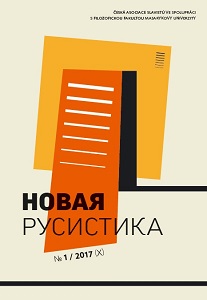Podoby a proměny židovství: Jiří Weil (1900–1959)
The images and metamorphoses of Jewishness: Jiří Weil (1900–1959)
Author(s): Ivo PospíšilSubject(s): Language and Literature Studies
Published by: Česká asociace slavistů
Summary/Abstract: The author of the present study deals with the role of Jewish intellectuals in interwarCentral Europe, especially in Czechoslovakia, attempting at the typology of theirsocial positions:1. They tended towards Orthodox judaism forming certain enclaves which diminishedtheir potential role in the majority population.2. They tended towards new streams in Jewish thought (Jiří Mordechai Langer, FranzKafka), e. g. towards chasidism.3. They tried to formulate universal and innovative patterns of thought (Jesus, Newton,Marx, Freud, Einstein etc.).4. They voluntarily assimilate identifying themselves with a certain nation or systemof government (the first Czechoslovak Republic under Masaryk and Beneš).5. They tried to conceal their Jewishness or to reduce their Jewish origin because of thethreats from the majority population (pogroms, holocaust) and political movementsbased on racism, antisemitism etc.Jiří Weil (1900–1959), a Czech-Jewish communist, gradually belonged to the thirdand to the fifth types (in the 1940s and 1950s). He was a propagator of Russian Sovietliterature, its experimental part, wrote about Leskov’s skaz and his narrative techniquein general, visited the U.S.S.R. several times, but returned disappointed: he was expelledfrom the communist party, was sent to one of the gulags. His two novel depicting his experiences from Soviet Russia were published before the Second World War andafter, the second one many years after his premature death: Moscow-Border (1937),The Wooden Spoon as a samizdat and later officially at the beginning of the 1990s. Hisliterary career is connected with the swan song of the Russian artistic avantgarde.
Journal: Новая русистика
- Issue Year: X/2017
- Issue No: 1
- Page Range: 81-93
- Page Count: 13
- Language: Czech

